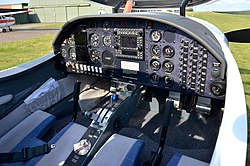This article relies largely or entirely on a single source .(February 2025) |
| A 210 | |
|---|---|
 | |
| General information | |
| Type | Two seat light aircraft |
| National origin | Germany |
| Manufacturer | Aquila Aviation by Excellence |
| Status | In production 2011 |
| Primary user | Cameroon Air Force |
| Number built | 120 by early 2011 |
| History | |
| First flight | 5 March 2000 |

The Aquila A 210 is a two-seat reinforced plastic light aircraft produced in Germany from 2002. It remains in production in 2022 as the updated A211.
